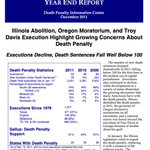The Death Penalty in 2011: Year End Report
Posted on Dec 15, 2011

PRESS RELEASE Top
DPIC’s Year End Report: Death Sentences Drop Well Below 100; Lowest Number Since Capital Punishment was Reinstated in 1976
Executions Decline Nationwide; Texas Executions Decrease by Almost Half Over Two Years
(Washington, D.C.) New death sentences dropped to 78 in 2011, representing a dramatic decline from last year’s number of 112 and marking the first time since capital punishment was reinstated in 1976 that the country has produced fewer than 100 death sentences in a single year, according to a report released today by the Death Penalty Information Center (DPIC), based on data as of mid-December. Death sentences have declined about 75 percent since 1996, when 315 individuals were sentenced to death.
Executions have also steadily decreased nationwide, with 43 in 2011 and 46 in 2010, representing a 56 percent decline since 1999, when there were 98. Texas had 13 executions in 2011, and 24 in 2009, representing a 46 percent drop over two years. Read “The Death Penalty in 2011: Year End Report” at www.deathpenaltyinfo.org.
“This year, the use of the death penalty continued to decline by almost every measure. Executions, death sentences, public support, the number of states with the death penalty all dropped from previous years,” said Richard Dieter, DPIC’s Executive Director and the report’s author. “Whether it’s concerns about unfairness, executing the innocent, the high costs of the death penalty, or the general feeling that the government just can’t get it right, Americans moved further away from capital punishment in 2011.”
Many states with the death penalty on the books, including Maryland, South Carolina, Missouri, and Indiana, had no new death sentences this year. California had a sharp drop in death sentences in 2011, decreasing by over half since 2010 when there were 29 sentences. Repeal of the death penalty is likely to be on the ballot in that state next year.
The declining numbers occurred in the context of three significant developments in the evolution of capital punishment this year:
- Illinois Governor Pat Quinn signed legislation to repeal the death penalty, making Illinois the fourth state in four years to abandon capital punishment. A commission reported that the state had spent $100 million on assisting counties with death penalty prosecutions while the state’s deficit grew to one of the country’s largest.
- Many Americans were shocked to learn that a man, Troy Davis in Georgia, could be executed in spite of strong doubts about his guilt. Several key witnesses recanted their testimony against Davis, causing even death penalty supporters like former U.S. Rep. Bob Barr to state: “Imposing a death sentence on the skimpiest of evidence does not serve the interest of justice.”
- Oregon Governor John Kitzhaber stopped a pending execution and ordered that no others would occur during his term. Governor Kitzhaber, who oversaw two executions in the 1990s, urged citizens to “find a better solution” to a system that he said is arbitrary, expensive and “fails to meet basic standards of justice.”
Also this year, the Gallup Poll, which measures the public’s support for the death penalty, but without offering alternatives, recorded the lowest level of support and the highest level of opposition in almost 40 years. Only 61 percent supported the death penalty, compared to 80 percent in 1994. Thirty-five percent were opposed, compared to 16 percent in 1994. A more in-depth CNN poll gave respondents a choice between the death penalty and life without parole for those who commit murder. Fifty percent chose a life sentence, while 48 percent chose death.
###
Death Penalty Information Center is a non-profit organization serving the media and the public with analysis and information on issues concerning capital punishment. DPIC was founded in 1990 and prepares in-depth reports, issues press releases, conducts briefings for the media, and serves as a resource to those working on this issue. DPIC is widely quoted and consulted by all those concerned with the death penalty